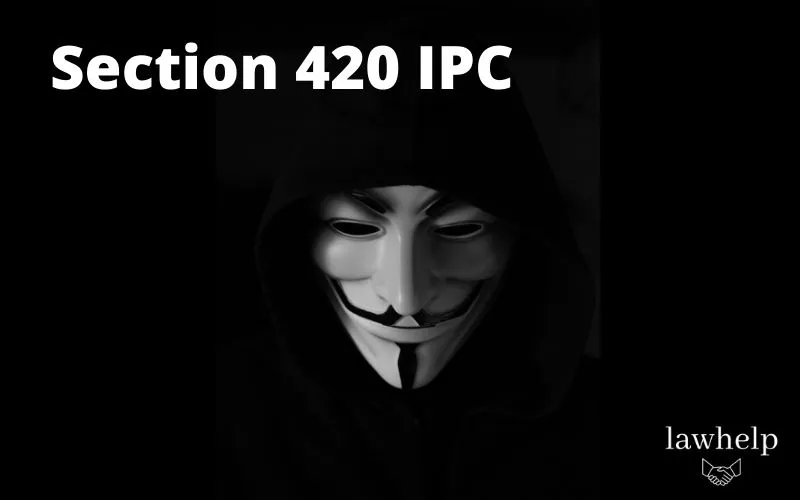Table of Contents
Section 420 IPC
Introduction
Section 420 IPC of the Indian Penal Code defines “Cheating and dishonestly inducing delivery of property”. In simple language, if any person with dishonest intentions induces someone to deliver the property to any person or causes him to alter or destroy the whole or part of valuable security, shall be punished under this section.
Section 420 IPC definition
Whoever cheats and thereby dishonestly induces the person deceived to deliver any property to any person, or to make, alter or destroy the whole or any part of valuable security, or anything which is signed or sealed, and which is capable of being converted into a valuable security, shall be punished with imprisonment of either description for a term which may extend to seven years, and shall also be liable to fine.
Section 420 IPC Quick Details
| Cognizance | Cognizable |
| Bail | Non-Bailable |
| Trial | Magistrate First Class |
| Compoundability | Compoundable by the person cheated |
| Punishment | Imprisonment of up to 7 years along with a fine. |
===============================================================================
The Essential Elements for Section 420 IPC:
Cheating:
Section 415 of IPC defines the term cheating. In the case of an offence under Section 420 IPC cheating ingredient is mandatory in every offense committed.
According to section 415 “Whoever, by deceiving any person, fraudulently or dishonestly induces the person so deceived to deliver any property to any person, or to consent that any person shall retain any property, or intentionally induces the person so deceived to do or omit to do anything which he would not do or omit if he were not so deceived, and which act or omission causes or is likely to cause damage or harm to that person in body, mind, reputation or property, is said to “cheat”.
Dishonest intention:
It is a well-established principle of law that to hold a person guilty of the offense of cheating it has to be shown that his intentions were dishonest at the time of making a promise.
A dishonest or deceiving intention cannot be concluded from the fact that he could not subsequently fulfill his promise.
Similarly, dishonor of a cheque in all cases cannot give a rise to a criminal offense under section 420, IPC.
The basic ingredient of the offense under section 420, IPC would be that the cheater had the intentions to cheat from the very inception. In other words, to hold a person guilty of the offense of cheating it has to be proved that his intentions were dishonest at the time of making the promise.
His dishonest intention cannot be inferred from the mere fact that he subsequently failed to fulfill the promise.
Valuable Property
Things that can be measured in terms of money are defined as property. The particular property should be under the possession of a person and clearly using the property for enjoyment or some other purpose.
Fraudulently
The term “fraudulently” is defined under section 25 IPC, which says that a person committing fraud or acting fraudulently, if he is having the intention to defraud but not otherwise.
Mens rea
Men’s rea is a legal phrase that defines the mental condition or state of a person while he is committing a crime, that is the intention behind every crime.
It is an intention to break the law or any other preconceived or prearranged plan to commit a particular crime. The prosecution must prove beyond any reasonable doubt to convict an accused person that he intentionally or knowingly contributed to a crime that affected another person or property.
===============================================================================
Is Section 420 A criminal offence?
Yes, section 420 is definitely a criminal offence, that’s why it is mentioned in the Indian Penal Code as a offence. It is infact a bigger offence than simple cheating described in section 415, in cases of simple cheating the punishment is imprisonment which may extend to one year or fine, or both, but under section 420 punishment is much higher.
Following are the few illustrations of cases for you to understand what comes under this section:
Illustrations
- There are two people A and B, A shows B, a brochure of a product and makes B believe that product belongs to a particular well-known brand and makes B pay for that false product, here A has committed Cheating with B.
- A and B enter into an agreement to sell, where A agreed to sell his land to B and took part payment, A sold the land to somebody else, A committed Cheating with B under section 420.
- A purchased goods from B and gave him cheque A also assured B that when cheque will be presented in the bank it will be honoured as A is having sufficient bank balance in his account to clear his liability. When cheque was presented in the bank it came back with remarks insufficient balance so the cheque was dishonoured. A has cheated B.
- A floated a fake financial company and started getting deposits from the people with a commitment to pay a higher rate of interest. FIR under Section 420 can be filed by each depositor who is cheated by A.
===============================================================================
Punishment under section 420 IPC
If a person is convicted under this section then he can be awarded imprisonment of up to 7 years along with a fine.
Which Court to try offences of Section 420 IPC
Offences under Section 420 IPC are triable by the Magistrate first class of the area where the offence under this section has taken place.
Territorial Jurisdiction of the court
The territorial area where the offence under Section 420 IPC has been committed, that court has the jurisdiction over the matter to put the accused to trial.
In this regard, two cases are important to understand the territorial Jurisdiction of the court.
In the first case the accused purchased goods from the complainant who was in Kerala, good supplied to the accused at Ahmedabad by the complainant. The payment of the goods was to be received by the complainant in Kerala.
The accused refused to make the payment of the goods received by him. Nonpayment of goods by the accused. Kerala court has the jurisdiction. Criminal proceedings at Ahmedabad were quashed by the Kerala High Court. Augustine Versus Omparkash Nanakram, 2001 Kerala.
In the second case, there is an agreement between the parties that the Lucknow court will have the jurisdiction in case of dispute, one of the parties committed offence of cheating in Delhi.
The Delhi court will be having jurisdiction. Agreement with regard to jurisdiction of court applies in civil matters and not in criminal matters.
===============================================================================
Is section 420 IPC Bailable or non-Bailable?
Bail under section 420 IPC
Section 420 IPC is non-bailable which means the police officer or the magistrate court cannot grant bail to the accused as a matter of right. The person has to apply for the bail and if the concerned court is convinced then he can be released on bail.
If the bail is rejected then the person can approach the Sessions Court or the High Court for the Bail. If a person accused of Section 420 IPC wants to file Anticipatory Bail then he can directly approach the Sessions Court or the concerned High Court.
Compromise in Section 420 IPC, allowed or not?
Compounding of Section 420 IPC
The offence under section 420 IPC is compoundable as per the provision of Section 320 of the Criminal Procedure Code.
At the instance of the person who has been cheated can compound the offence under section 420 IPC by entering into a valid agreement with the accused person, subject to the permission of the court.
What the court has to see is that it is a lawful compromise and not made under any coercion or duress or similar other circumstances vitiating the compromise. Deepak Bhardwaj Versus State 2001 Delhi.
If the compromise is against any public policy that compromise may not be acceptable to the court and the court can refuse to grant the permission to compromise in the matter.
It has been observed by the courts in many cases that police unnecessarily object to the valid compromise between the parties and in those cases court has concluded that it would be highly improper to refuse permission in such circumstances.
===============================================================================
Frequently asked questions:
Q1. What does IPC section 420 state?
Ans: Whoever cheats and thereby dishonestly induces the person deceived to deliver any property to any person, or to make, alter or destroy the whole or any part of valuable security, or anything which is signed or sealed, and which is capable of being converted into a valuable security, shall be punished with imprisonment of either description for a term which may extend to seven years, and shall also be liable to fine.
Q2. Is Section 420 a bailable offence?
Ans: The offence committed under section 420 IPC is a Cognizable and Non-bailable offence. This offence is compoundable by the complainant who has been cheated, with the permission of the court.
Q3. What are the ingredients of Section 420 IPC
Ans: The ingredients to constitute an offence under Section 420 IPC are as follows:
a) A person must commit the offence of cheating under Section 415;
b) The person who was cheated must be dishonestly convinced to deliver the property to any person;
c) Make, alter or destroy the whole or any part of valuable security, or anything which is signed or sealed, and which is capable of being converted into a valuable security.
Q4. What is the punishment for money cheating cases in India?
Ans: The person who has committed an offence under Section 420 IPC and is convicted by the court, can be punished with imprisonment of either description for a term which may extend to seven years, and shall also be liable to a fine.
Q5. Can I file a civil case as well as a criminal case for offence under Section 420?
Ans: Yes, you can file Civil as well as Criminal cases against the person who has committed offence under section 420 IPC against you, and both the cases can run simultaneously.
You may also like to read:
- Section 376 IPC, Punishment for rape.
- Section 307 IPC
- Document required for selling car/vehicle in India.
If you have any questions or comments regarding Section 420 IPC you can ask in the comments section below.




